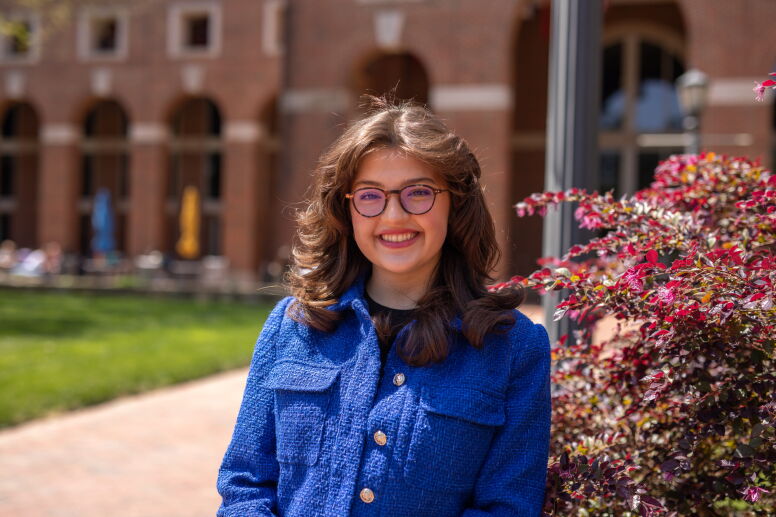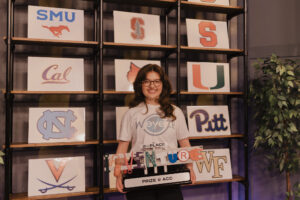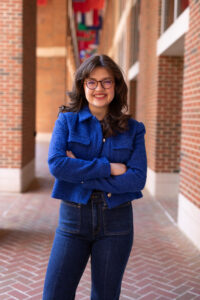News & Stories
Seeing is believing

Sasha Surkin (BSBA ’25) didn’t exactly know why she was mailing a handwritten letter to Oprah Winfrey when she was in seventh grade, but she just knew she had to.
“I think I just wanted to talk to her. I guess back then I probably wanted to work for her. I wanted to be her apprentice,” says Surkin. “I’m still waiting on the reply.”
She doesn’t need a reply. Surkin has been a serial entrepreneur for almost a decade. Her newest and biggest project yet is WeyeZE (pronounced “wise”), the startup she created after inventing a personalized corrective-lens eyeglasses kit. The goal: improve the accessibility and affordability of quality vision care.
The kit is in beta testing and she’s preparing for another round of seed funding while she continues her studies in UNC Kenan-Flagler’s Undergraduate Business Program (UBP).
WeyeZE has made impressive waves since it launched in March 2021 when Surkin was 18. She participated in several prominent pitch competitions, placing second for the 2024 National ACC InVenture Prize, which aired live on PBS, and winning $10,000.
WeyeZE received a $10,000 grant from the NC IDEA Foundation, and when Surkin was in high school, she got a $50,000 grant as the winner of the 2020 Archangel Dreamer Competition, funding what became WeyeZE. In April 2024, she won first place and $12,000 at the inaugural Joan and Chester Luby Pitch Competition through startup incubator Innovate Carolina.
“I am so optimistic because I’m driven by the people who needed it yesterday,” she says. “This year will be all about getting this closer to that.”

Surkin doesn’t just have an entrepreneurial mindset; she has an entrepreneurial mindset times 10.
Surkin keeps an “ideas folder” with a list of whatever comes to her mind at any given time, like a mask for cows that filters the production of environmentally destructive methane gas. In the sixth grade, she created her first business, a kit to make tote bags using just duct tape, staples and fabric scraps.
Her parents encouraged her inquisitive nature, interest in science and her intuitive and developing business acumen. They’d leave copies of Scientific American around the house and regularly drove Surkin from their home next to an old tobacco field in rural Greenville, North Carolina, to Raleigh to take Mandarin language classes. (She’s fluent.)
“I don’t know if stress is the right word, but I’ve been stressed about having my big business idea since I was very young,” says Surkin. “I knew I wanted to invent something. I knew I wanted to create something. I knew I wanted to run my own company. I would tell people when I was younger that I was going to be the CEO of Apple.”
At 15, Surkin was inspired to create WeyeZE after reading story in The New York Times about how lack of access to vision care created a $250 billion deficit in global productivity. The story featured a young student in India who wanted to become a pilot but couldn’t because of his degraded vision until a traveling eye care clinic visited town.
At the same time, Surkin experienced her own vision problems. She went to an optometrist and ordered glasses, which was covered by her parent’s health insurance, at Costco.
Her idea was to simplify the process in the form of an eyeglasses kit someone can use completely on their own to create new corrective glasses within minutes or to adjust the types and strengths of lenses to fit unique, changing needs.

It’s not just about convenience. Numerous forms of economic inequity create barriers to vision-care access, including lack of insurance coverage, limited options for transportation and the cost of screenings and glasses, according to a 2022 article in the American Academy of Ophthalmology. The World Health Organization estimates that more than 700 million people globally need glasses.
“WeyeZE was created initially to provide glasses to those who don’t have an optometrist in their area,” says Surkin. “It’s since transformed into something that can be offered as a convenient way to bring healthcare equity into the vision-care space. It’s empowering the individual.”
Visionary
Surkin brought WeyeZE with her to Carolina as an assured admit to the Business School. She sent Professor Jim Kitchen (BA ’87) an email out of the blue early in her first year, introducing herself and WeyeZE. Over FaceTime in her dorm room, she showed Kitchen the product and he was enthusiastic, mentioning he could see her entering it in the ACC Competition she later participated in.
She got feedback from fellow students, valuable support from faculty such as Professor Ted Zoller and Professor Melissa Geil, and staff such as Jackie Fritsch, UBP associate director of admissions and recruitment.
“The thing I always loved about UNC Kenan-Flagler is the air of creativity. There’s a buzz when you walk in,” says Surkin. “The people make the place. I saw quickly that my desire to do this would not only be supported but encouraged.”
She’s a Luther Hodges Scholar, a Wayland H. Cato Jr. Merit Scholar and an Honors Carolina student, but WeyeZE always has been a priority. When she went on a Global Immersion Elective to Alaska during her first year at the Business School, she brought a WeyeZE prototype with her in a small plastic baggie to show those working at the Alaskan Native Tribal Health Consortium. They wanted to keep it.
The plan is for the glasses kit to go to market soon, and she is taking pre-orders. She’s still doing everything herself — crafting new iterations, marketing WeyeZE on social media and managing fundraising. She will soon launch a pilot program for WeyeZE, ideally at a North Carolina school in a lower-income area.
“I went surfing for the first time last summer, and entrepreneurship feels a lot like surfing,” she says. “You try to get on the board, fall and then paddle back out. So much of what entrepreneurship is lies in the process of paddling back out. It’s not in the success that you feel when you get up on the board. It’s not in the failure and the pain you feel when you get a nose full of salt water. It’s about putting your head back up and trying again.”